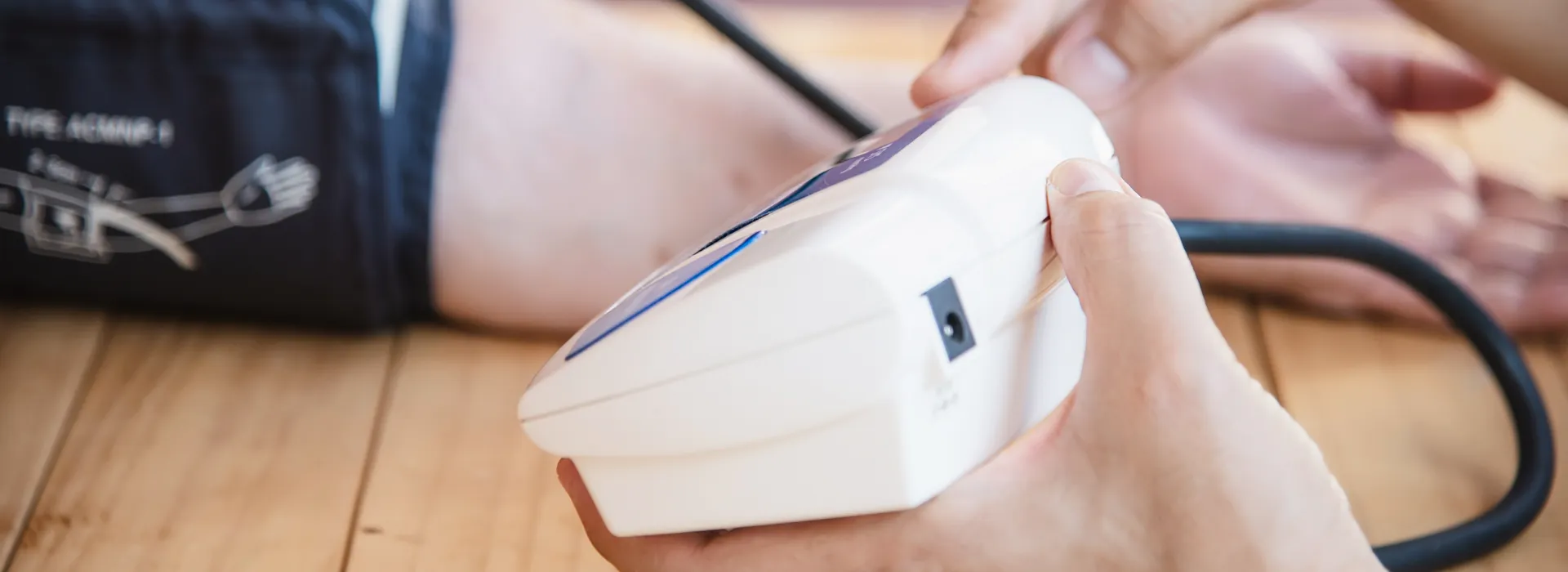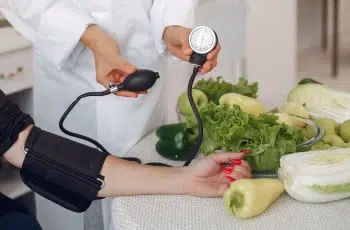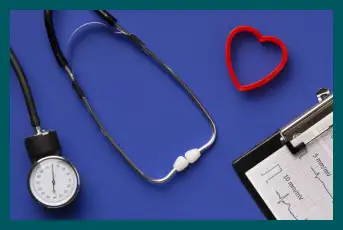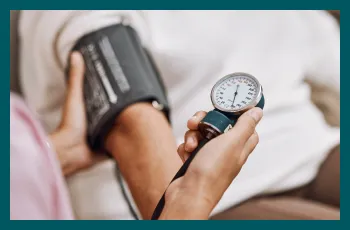How blood pressure affects your organs?
Written by the editorial staff writer at Hola. Medically Reviewed by Dr Mark Mellor, FRACGP DCH MBChB BSc and Dr. Ammar AL-ANI, MBChB, CCBST, AMC. Blog updated on 18 November, 2025. Originally published on 26 October, 2024.

Contents

Overview
Did you know that around one in three Australian adults has high blood pressure1, and most of them are unaware? This means millions of people might already be unknowingly putting extra pressure on their organs. Blood pressure isn’t just a number—it shows how effectively your heart pumps blood through your arteries and how well your organs are being nourished. When this pressure remains too high for a long time, it can quietly damage your heart, brain, kidneys, and eyesWhat is blood pressure?
Blood pressure (BP) indicates the force of your blood against the walls of your arteries. It is measured in millimetres of mercury (mmHg) and expressed as two numbers, such as 120/80 mmHg.- Systolic pressure (the top number): This is the pressure when your heart contracts and pushes blood out.
- Diastolic pressure (the bottom number): This is the pressure when your heart relaxes between beats.
Affect of high blood pressure
High blood pressure doesn’t target just one organ—it can affect different parts of the body. Here’s a quick overview of what happens inside your body when blood pressure stays too high for long.Heart
The heart works harder to pump blood against higher pressure.Key effects over time:
- The muscles of the left ventricle (its primary pumping chamber) thicken
- Increased risk of heart attack and heart failure
- Arrhythmias (irregular heart rhythms)
- Angina or chest pain
Brain
Your brain needs a steady blood flow to function well. Chronic hypertension can impair or weaken its blood vessels.Risks include:
- Stroke or mini-strokes (TIAs)
- Cognitive decline or dementia
- Poor memory and concentration
Kidneys
The kidneys filter waste from the blood through tiny, delicate vessels. They are highly sensitive to elevated pressure levels.Consequences:
- Chronic kidney disease (CKD)
- Fluid retention and swelling
- Increased risk of dialysis or transplant in severe cases
Eyes
Your retina (the black of your eye) depends on fine blood vessels. High BP can damage them.Possible impacts:
- Blurred or double vision
- Risk of vision loss over time
- Early signs can be detected during eye checks
Arteries and circulation
Constant high blood pressure puts strain on blood vessels throughout your body.Effects:
- Atherosclerosis (hardening and narrowing)
- Peripheral artery disease (PAD)
- Poor circulation, cold hands/feet, leg pain when walking
Reproductive health and sexual function
This is less discussed, but blood flow is vital for reproductive organs.Potential impacts:
- Erectile dysfunction (in men)
- Reduced blood flow affecting sexual health (in women, too)
- Hormonal and vascular impacts
Feeling sick and unsure why? Talk to a doctor online, available 24/7
Warning signs
One of the most challenging aspects of high blood pressure is that it often develops quietly. Many people feel perfectly fine even when damage is already happening. Here are a few signs to look out for:- Dizziness
- Occasional headaches
- Fatigue
- Blurred vision
How to protect your organs?
Here are a few simple steps to protect your organs: Keep blood pressure within a healthy range (ideally below 120/80 mmHg)Lifestyle changes and tips:
- Eat heart-healthy foods and reduce your salt intake
- Exercise regularly
- Limit alcohol and quit smoking
- Manage stress
- Maintain a healthy weight
Medical and monitoring support
- Check blood pressure regularly, at a pharmacy or GP
- Follow up with your GP for kidney function tests, eye checks, and other tests
- Take medications as prescribed
How Hola Health can help
At Hola Health, we hold the belief that awareness leads to empowerment. Gaining insight into how blood pressure affects your organs paves the way to a healthier lifestyle. Hola Health can support by:- Reminders and tools to monitor your BP regularly
- Educational guidance on exercise, diet, and habits
- Tips on when to consult online GP
Conclusion
High blood pressure doesn’t just strain your heart; it can silently affect your brain, kidneys, eyes, blood vessels, and sexual health. The good news is that many effects can be managed with prompt action. Get into the habit of checking your blood pressure regularly, staying physically active, eating wisely, managing stress, and consulting your GP. Your organs will thank you!FAQs
What organs are affected by high blood pressure?
The heart, kidneys, brain, eyes, arteries, and even reproductive systems are affected.How does high BP damage the heart and brain?
It forces the heart to pump harder (thickens its muscle), promotes plaque formation, and injures blood vessels in the brain. This may trigger strokes or chronic small-vessel damage.Can high blood pressure cause kidney failure?
Yes, over time, damaged vessels in the kidney impair their filtering function. Severe damage might require dialysis or a kidney transplant.Does lowering BP reverse organ damage?
Early changes (like vessel wall strain or slight thickening) can sometimes be reversed. However, existing damage, such as scar tissue or advanced structural changes, may not completely heal. Still, slowing additional damage is highly beneficial.What are the early signs of organ damage from BP?
Usually none. In some cases, headaches, dizziness, blurred vision, or fatigue. But these signs often show up late.How often should I check my BP in Australia?
If you’re healthy and have no risk factors, a blood pressure check every 1-2 years is sufficient. If you have risk factors like diabetes, obesity, or family history, or elevated readings, more frequent checks are recommended.Which lifestyle change helps the most?
Lowering salt consumption, engaging in regular physical activity, keeping a healthy body weight, reducing alcohol intake, stopping smoking, and managing stress are the most beneficial practices.Need time off to recover? Request an online medical certificate with Hola.
Reference
- High blood pressure (hypertension) - reference link
- Key statistics: Cardiovascular disease - reference link
- Chronic kidney disease: Australian facts - reference link
Providing consult for
- Cough
- Nausea & vomiting
- Fever
- Hayfever
- Fatigue
- Sore throat
- Acne
- Gout
- Eczema
- Rosacea
- Sunburn
- UTI
- Erectile dysfunction
- Contraception
- Morning sickness
- Morning after pill
- Prostate health
- Anxiety
- Depression
- Stress
- Grief & loss
- Premature ejaculation
- Asthma
- Blood pressure
- Diabetes
- Cholesterol
- Migraines & headaches
- Allergies
- Heartburn & reflux
- Sleep disorder
- Gastro
Related Articles
Healthy Blood Pressure By Age: What Is Good Blood Pressure Based On Age?
Disclaimer
This blog is for general informational purposes only and does not indicate that Hola Health provides all treatments or preventive measures mentioned. It is not intended to be a substitute for professional medical advice. Always seek the guidance of your doctor or other qualified health professional with any questions you may have regarding your health or a medical condition. For emergencies please immediately contact 000. Any medical topics discussed are intended to educate, not to imply availability through Hola Health.




